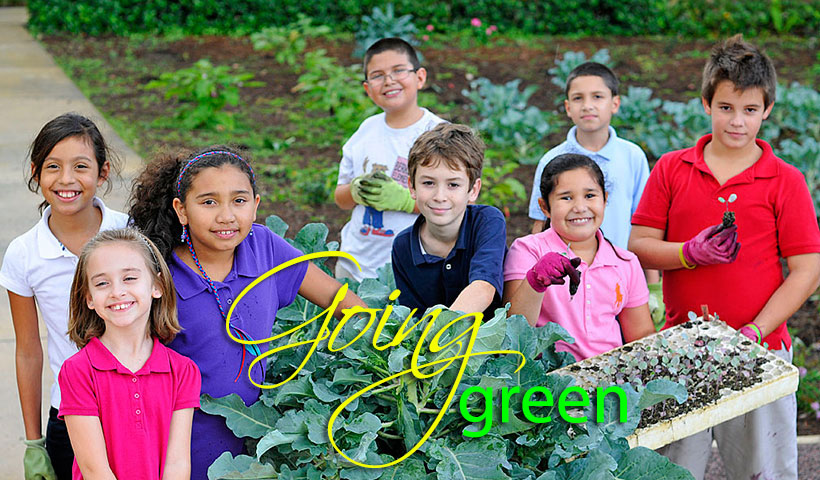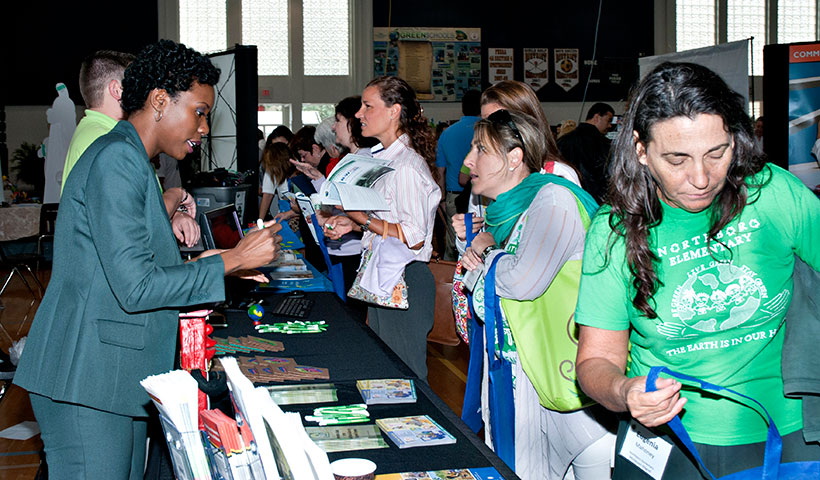

The School District takes a command role in being a good steward of the natural resources and developed environment and espouses the notion that conservation and resource efficiency are everyone’s responsibility. One vehicle for executing the District’s activist environmental policy is its Green Schools Initiative, involving all members of the county’s 187 schools, administration, and school communities; the initiative is led by the Division of Support Operations. The three main pillars of the Green Schools Initiative are Building Green, Learning Green, and Living Green.
The Green Schools Initiative includes activities and partnerships that underscore the need for environmental stewardship and illustrate the important relationship between personal wellness and the health and sustainability of our one and only planet.
The School District of Palm Beach County has undertaken serious efforts to build and maintain green schools. In May 2009, as part of a policy to encourage energy and water conservation, the District included a provision stating that, “The District shall plan, design, construct, operate and maintain all new District buildings to meet the Leadership in Energy and Environmental Design (LEED) Silver certification level. The District will endeavor to make all existing District buildings LEED certified based on available resources.”
Some of the benefits of building green schools include energy savings, measurable reductions in waste generation, decreased water use, and improved indoor air quality. Other benefits are less tangible and harder to demonstrate empirically, but are no less desirable. These include improvements in occupants’ health and sense of wellbeing, increased employee morale, productivity, recruitment, employee retention and improved student achievement.
Another important component of the Green Schools Initiative is to support all schools in their efforts to bring sustainability concepts to the campus and to the classroom. Students in a majority of the District’s schools participate in green education, either through traditional classroom curriculum or “experiential” learning outside the classroom. Some of the topics covered include energy and water efficiency, waste reduction and recycling, as well as lessons about the importance of good indoor environmental quality and healthy outdoor environments.
Another mechanism used to highlight this concept is the Green Schools Recognition Program (GSRP), which, in 2011, celebrated its fourth year in Palm Beach County. The program serves to encourage cultures of sustainability within school communities and recognizes K-12 public and private schools that have made strides in improving their overall environmental performance. The top schools receive cash awards to be used to further their efforts. The GSRP is an initiative of Florida Atlantic University’s Pine Jog Environmental Education Center. Community sponsors include Solid Waste Authority, Florida Power and Light, the Chastain Charitable Foundation, Get Paid to Recycle, SchoolPool, Slow Foods Glades to Coast, and Audubon Society of the Everglades.
A complete list of participating schools can be found at:
The highest honor for its efforts from this 2011-2012 school year’s recognition program went to:
First Place - St. Joseph’s Episcopal School, who received a cash prize of $2,000
Second Place – Marsh Pointe Elementary, who received $1,000
Third Place (three-way tie) – Berkshire Elementary, Roosevelt Middle, and South Grade Elementary, who each received $500
On November 11, 2011, the third annual LEARN GREEN conference was held at Alexander W. Dreyfoos School of the Arts in West Palm Beach. It included a one-day forum of workshops and exhibits that provide opportunities for school staff, parents, administrators, and students to learn how to “go green” at school and at home. Almost 100 exhibitors and over 850 participants from public and private schools from around the state of Florida attended the conference. The strong underlying message of the conference was, “You do not need to have a green school building to build a green school!”

More than 850 attendees and 100 exhibitors filled the gymnasium of A.W. Dreyfoos School of the Arts during the
2011 Learn Green Conference and Expo. Teachers and other participants connected with businesses
such as the Solid Waste Authority, FPL, and Dade Recycling.
A final component of the Green Schools Initiative is the application of sustainability concepts into the District’s daily operations. Specifically, the District works to reduce its consumption of natural resources, reduce waste generation, increase reuse and recycling rates, manage school environments to achieve healthier indoor air quality, and build institutional capacity for sustainability.
The School District currently has a very robust recycling program, which includes paper, cardboard, mixed commingled materials (plastic, glass, aluminum, and drink containers), ink and toner cartridges, electronics (“e-waste”), some food packaging, empty glue sticks, shoes and clothes, rechargeable batteries, and scrap metal. Some schools even compost organic waste onsite and use the material to fertilize their gardens.
The Green School Initiative’s measurable outcomes include a 4.0% reduction in energy usage in 2011-2012 school year over the 2010-2011 school year, and a diversion of more than 780 tons of mixed plastic, glass, and aluminum and 6,253 tons of paper products from the landfill, saving over $550,000 in disposal fees. The District also collected recycling rebates of over $15,000 for electronics waste, $16,000 for paper, and almost $8,000 for ink, toner cartridges and cellular phones.
In an effort to achieve healthier Indoor Air Quality (IAQ) in schools, staff from the Environmental & Conservation Services (ECS) department conduct assessments and abate sources of air quality concerns. Twelve major IAQ remediation projects were completed by ECS staff in the 2011-2012 school year. ECS collected 137 radon initial and repeat samples in new facilities and buildings sampled 5 years ago, with no sample exceeding the regulatory limit.
Individual schools implemented many new sustainable practices and participated in projects that enhanced their environmental well-being. Among other projects, schools installed edible, butterfly, and hydroponic gardens, instituted innovative recycling programs, created “green” curriculum connections and engaged the community in their sustainability efforts.
